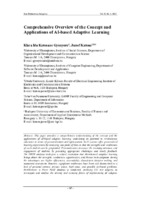Comprehensive Overview of the Concept and Applications of AI-based Adaptive Learning
Metadata
Show full item record
URI
Collections
Abstract
This paper provides a comprehensive understanding of the concept and the
applications of AI-based adaptive learning, underlining its potential to revolutionize
education in terms of personalization and optimization. Such systems offer personalized
learning experiences by analysing vast pools of data so that the strengths and weaknesses
of each student can be pinpointed. Personalization increases the learning outcomes and
engagement of students by providing appropriate challenges and timely feedback.
The SWOT analysis underpins a critical evaluation that AI-enhanced adaptive learning
brings about: the strengths, weaknesses, opportunities, and threats in its adoption. Among
the advantages are higher efficiencies, accessibility, data-driven decision making, and
automated assessment. However, significant weaknesses have been well documented as a
lack of personal contact, privacy issues, high costs, and possible technical problems.
Furthermore, a Force Field Analysis is conducted, involving 112 test subjects, to
investigate and analyse the driving and resisting forces of implementing AI adaptive learning. Driving forces include advancing technology, educational needs, social and
economic pressures, facilitative government policies, and the ability to identify learning
patterns, resisting forces emanating from technological failures, costs, privacy and security
threats, lack of interpersonal interaction, and issues about ethics and sociology. The paper
illustrates the dynamic interplay of these factors to provide strategies that would harness
the supporting forces and mitigate the barriers in front. It concludes that AI-enabled
adaptive learning faces several significant obstacles. At the same time, it is strongly
potential for transformation into an inclusive and effective system.
- Title
- Comprehensive Overview of the Concept and Applications of AI-based Adaptive Learning
- Author
- Katonáné Gyönyörű, Klára Ida
- Katona, Jószef
- xmlui.dri2xhtml.METS-1.0.item-date-issued
- 2025
- xmlui.dri2xhtml.METS-1.0.item-rights-access
- Open access
- xmlui.dri2xhtml.METS-1.0.item-identifier-issn
- 1785-8860
- xmlui.dri2xhtml.METS-1.0.item-language
- en
- xmlui.dri2xhtml.METS-1.0.item-format-page
- 20 p.
- xmlui.dri2xhtml.METS-1.0.item-subject-oszkar
- artificial intelligence, education, adaptive learning, SWOT, Force Field Analysis
- xmlui.dri2xhtml.METS-1.0.item-description-version
- Kiadói változat
- xmlui.dri2xhtml.METS-1.0.item-identifiers
- DOI: 10.12700/APH.22.3.2025.3.9
- xmlui.dri2xhtml.METS-1.0.item-other-containerTitle
- Acta Polytechnica Hungarica
- xmlui.dri2xhtml.METS-1.0.item-other-containerPeriodicalYear
- 2025
- xmlui.dri2xhtml.METS-1.0.item-other-containerPeriodicalVolume
- 22. évf.
- xmlui.dri2xhtml.METS-1.0.item-other-containerPeriodicalNumber
- 3. sz.
- xmlui.dri2xhtml.METS-1.0.item-type-type
- Tudományos cikk
- xmlui.dri2xhtml.METS-1.0.item-subject-area
- Műszaki tudományok - informatikai tudományok
- xmlui.dri2xhtml.METS-1.0.item-publisher-university
- Óbudai Egyetem

